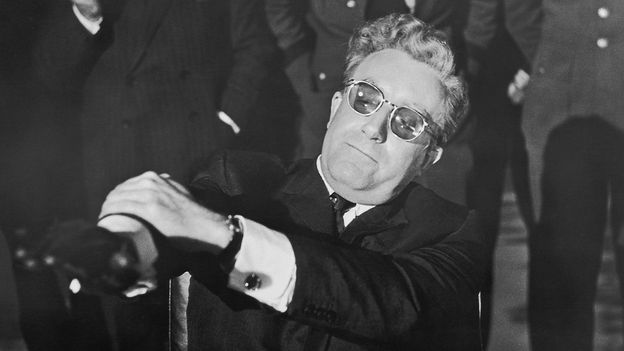It’s no surprise, then, that when the movie came out, both The Daily Mail and The Times claimed that Kahn was the prototype for Strangelove. But the Spectator dismissed the idea: “If Dr Strangelove is the type of the inhuman technician, utterly indifferent to the consequences of the exploitation of his discoveries, not only is Dr Kahn not the prototype of Dr Strangelove. He is almost the exact opposite of him. The difference, to put it succinctly, is that Dr Strangelove is mad and Dr Kahn is sane.” Certainly Kahn’s gregarious energy was nothing like Strangelove’s cold intensity. “How could my son be Dr Strangelove?” protested Kahn’s own father in 1968. “He is so warm and considerate.”
As it happens, Kahn was definitely the basis for the nuclear strategist Dr Groeteschele in Fail Safe, Sidney Lumet’s much more earnest 1964 film about a nuclear strike triggered by a computer error. But the media only cared about Strangelove. “Kubrick is a friend of mine,” Kahn told Newsweek. “He told me Dr Strangelove wasn’t supposed to be me.” Yet three years later he changed his story, claiming that the character was in fact a hybrid of Kissinger, Von Braun and himself. Unlike Teller, he was far from offended by the gossip. It bolstered his celebrity and his income.
As for the other candidates, writes Peter Goodchild, the Strangelove connection was “a stigma… enhancing their links with the nuclear nightmare”. Despite his biography’s subtitle, Goodchild argues that Strangelove was “clearly a composite”, not a caricature of one individual. In fact, the hunt for the “real” Strangelove smudges Kubrick’s satirical point.
While researching the movie, Kubrick was shocked by how the experts’ professional pride “seemed to completely overcome any personal involvement in the possible destruction of their world”. Strangelove is the demonic personification of a way of thinking about war – highly intelligent yet bloodlessly abstracted from the reality of human suffering – that infected many scientists, strategists and politicians during the Cold War, and has not disappeared. He is not a man but an attitude, and attitudes are immortal.
Dorian Lynskey is the author of Everything Must Go: The Stories We Tell About the End of the World (April 2024).
– videos and can’t-miss news delivered to your inbox every Friday.
on Culture, head over to our Facebook page or message us on Twitter.


